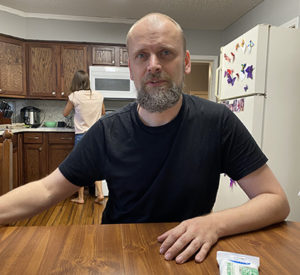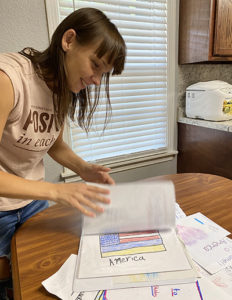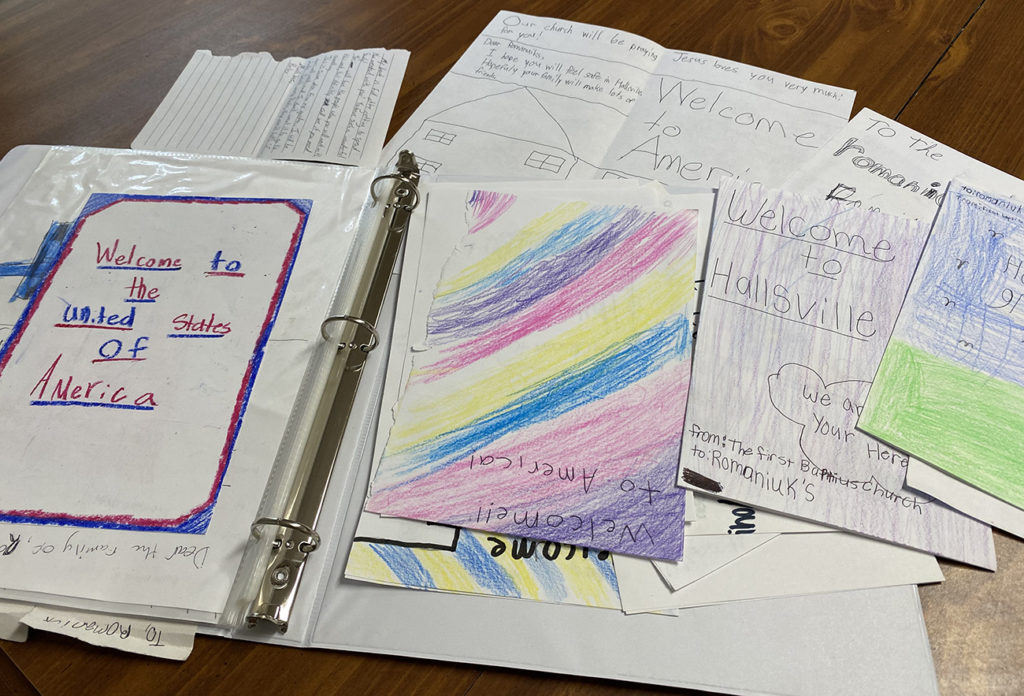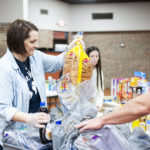HALLSVILLE—Pavlo Romaniuk considers it an understatement to say he and his family received a warm welcome to the United States from members of First Baptist Church in Hallsville.

“It was incredible. It was unbelievable. We didn’t imagine it was possible we would meet all these people who have made us feel more than just welcome,” he said. “They opened their hearts to us.”
The Hallsville congregation sponsored Pavlo and Larina Romaniuk and their three children—6-year-old Emilee and 4-year-old twins Deniel and Olivia—as part of the Uniting for Ukraine humanitarian parole program.
The Romaniuk family decided to leave their home in Vinnytsia in Central Ukraine, southwest of Kyiv, eight days after Russia began its assault on their homeland.
“If it had just been two of us, we never would have left. But it wasn’t safe for our children,” Larina said.
‘There was no safe place’
For a week, the family endured frequent bombing, as the Russian military targeted nearby television towers, an airport and other strategic sites near their home. Wailing sirens and explosions that rattled the windows of their house frequently interrupted their sleep.
“There was no basement in our home. So, there was no safe place to find shelter,” Pavlo said.
The family packed as many of their possessions as they could in their car and traveled 100 kilometers to the Moldovan border.
Once they crossed into Moldova, the family began a 2,500-mile journey that took them westward across Europe—first to Romania, then through Hungary, Slovenia, Italy, France and eventually to Spain, where they lived temporarily with Pavlo’s cousin in Barcelona.
Sign up for our weekly edition and get all our headlines in your inbox on Thursdays
“She had only one room for all of us,” Pavlo said.
The Romaniuk family moved to southern Spain where they lived more than three months. Then they heard President Biden’s announcement the United States would receive 100,000 refugees from Ukraine.
“We spent a lot of time trying to find a way to connect with someone who could help us,” Pavlo said.
Finally, through an internet search, he contacted a Samaritan’s Purse representative who was able to walk them through the process of connecting with a sponsor.
‘Love the sojourner’
Meanwhile, more than 5,000 miles away, Daniel Brewer contacted his twin brother Porter, associate pastor for students at First Baptist Church in Hallsville. He shared information from a Samaritan’s Purse video inviting churches in the United States to sponsor and help resettle refugee families from Ukraine.
Porter Brewer talked to Senior Pastor Mark Moore, the church’s finance director and other leaders, asking if First Baptist in Hallsville could sponsor a family from Ukraine.
“They were all in without any question,” Brewer said. “Our church’s heart is to do what Scripture says—‘love the sojourner, for you were sojourners in the land of Egypt.’ We believe that is a command of God that is to be taken seriously.”
The Eastern European family and the East Texas church connected. A little more than two weeks ago, the Romaniuks arrived at Dallas-Fort Worth International Airport.
Brewer met the family at the airport—waiting six hours with them until their airline was able to locate their lost luggage.
“Porter is so nice. He is such an incredible man,” Larina said.
‘It was God’s timing’
Pavlo noted the same could be said for everyone they have encountered at First Baptist in Hallsville.
“Every day after we arrived here, a different family has brought us food,” he said. “And they spend a little time with us, getting to know us and letting us know they are happy to have us here.”
The Romaniuks moved into the church’s parsonage.
“It was God’s timing,” Brewer said. “Our children’s minister had been living in the parsonage. She bought a house and moved out three weeks before the family arrived.”
Pavlo is a computer software engineer, and he has been able to continue to work for the same company that employed him when he was in Ukraine.
“Thank God I am able to work remotely. All the time we were traveling, I was able to continue working,” he said. “It’s not easy because of the time difference. I get up at 2 a.m. so I can be part of a meeting with my coworkers at 3 a.m.”
The Romaniuks are concerned for the safety of family and friends in Ukraine, and they are perplexed by the support the invasion of their homeland has garnered from people in Russia.
“All my life, we have thought of the Russians as our brothers and sisters,” Pavlo said. “Our lives intersected. Our cultures crossed. It makes no sense. It’s like a bad dream.”
‘The hand of God’
But now, they are focused on building a life for their family in the United States. The Uniting for Ukraine humanitarian parole program will allow the Romaniuks to remain in the United States for two years. In time, Pavlo hopes to find a software development job with a company based in the United States and apply for permanent residency.
“I’m a technical guy. It’s not always easy for me to express my feelings,” he said. “I can write code, but it’s not easy for me to find the right words.
“The thing that has impressed us most is the people It’s like something from a dream. We’ve been met with a lot of open hearts. We’ve met a lot of kind people.”

While the Romaniuks appreciate every act of kindness church members have shown, the gesture that meant the most to Larina is the handmade cards and notes children made, welcoming them to the United States.
She has collected them all in a loose-leaf notebook. Her voice chokes with emotion as she reads the notes aloud.
“This is our most valuable possession now,” she said.
Pavlo believes God has been at work, guiding their family every step of the way the past four months.
“It’s like a puzzle, with all the pieces fitting together. There have been so many coincidences that are not just coincidences,” he said. “I definitely feel like it’s the hand of God.”
















We seek to connect God’s story and God’s people around the world. To learn more about God’s story, click here.
Send comments and feedback to Eric Black, our editor. For comments to be published, please specify “letter to the editor.” Maximum length for publication is 300 words.